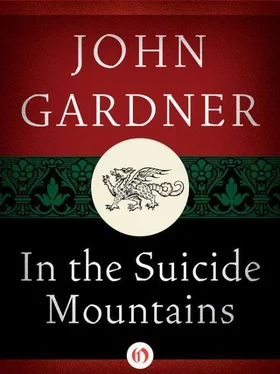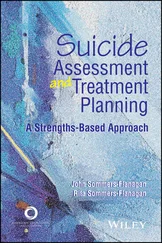“I,” said Christopher the Sullen, and touched his collar-bone, “should fight a dragon? ”
“Come come,” said the abbot. “Use your imagination.” He began pacing in a circle, into the hearth’s glow, out of it again, into it, out of it. “You say you want to kill yourself. I disapprove, naturally, as a man of the cloth (though I might make exceptions for a terminal illness that involved great pain), but on the other hand I can readily see your point, now that you mention the notorious six-fingered man. Very well, if you feel you must kill yourself, why not do it nobly, as Lycurgus did, for the benefit of mankind? Moreover — pay attention now — you may be wrong about everything, as I’ve said to you before. For all you know, the six-fingered man may have died way last January, from stepping on an icy patch and falling on his head. Ha! You hadn’t thought of that, had you, Prince Christopher! You’ll never win your rightful place in history by choosing self-destruction rather than confrontation with a man who’s in fact been dead for months. I don’t say he is , mind you. Very well, though. Excellent. Now we’re on the track.”
The circle he was pacing became tighter.
“Dying in conflict with a dragon would be heroic, my boy! — And come to think of it, I know just the dragon for you, and not far off. You ever hear of Koog the Devil’s Son?”
“Koog!” the prince whispered. The room went suddenly cold as ice. Armida gasped.
“You’ve heard of him I see,” said the abbot. “Excellent! Excellent! Now we’re on the track! He’s old, this Koog, and crafty as the serpent he is. No question! On the other hand, his age is not all an advantage: he’s hardly the dragon he once was, take my word! It’s just barely possible — this is merely an opinion — that a man might take him, if he went at it right.” He shot his face close to the face of the prince and whispered, looking back over his shoulder, “Old Koog’s got a magic charm on him, you know.”
“A charm,” said Christopher the Sullen. His mouth was slightly open. He noticed this and closed it.
“Exactly. Nothing can harm him when he’s in the dark of his cave. There was never a sword ever built that can scratch him. But out in the sunlight, ha! that’s quite another story! The question, of course, is how do you get a smart old dragon to come out in the sunlight where he’s vulnerable?” The abbot stood nodding, fascinated himself by this conundrum.
Prince Christopher cleared his throat. He said, “Fighting dragons isn’t basically my nature.”
“Nonsense, my boy,” said the abbot, almost nastily. Something crossed Armida’s mind, too quickly for her to catch it. “This suicide was your idea, not mine,” said the abbot. “I’m merely suggesting—”
“I’d been thinking of something rather quicker,” said the prince, “and not too painful. Standing there in chainmail at the mouth of a cave, and taking the flame of a dragon head on—” He winced. He decided to pour himself more brandy, crossed quickly to the low, round table (the bottle and glasses faintly glinted in the starlight), and filled his brandy snifter.
The abbot came over to him. Armida could barely make out their two dark forms. Like a kindly old uncle the abbot put his arm around the prince, unless Armida was mistaken. “Come now, Prince,” he urged, “let’s think this through. I won’t deny it could be painful. Of course it would be painful! Glory’s not cheap!” Now both of them were pacing in a circle, into the hearth’s dim light, out of it, in again … Armida strained to see. “But let’s not fool ourselves, my friend, about diving off a cliff. Believe me, I know about these things! First of all, there’s the unspeakable terror involved. You may say it’s more frightening to go charging against a dragon, but my friend, my dear friend, I doubt it. Think how it feels on the cliff-edge, standing looking down. True, we’ve all had the urge to fall. But how grim, how ghastly the actuality! How excruciatingly dreadful! And then there’s the fall itself — first the unexpectedly painful banging of the heart. Many people, you know, die of heart attack long before they hit. And then the gasping for air. It’s difficult to breathe, believe you me, hurtling down thousands of feet toward the rocks. And then the landing! Aie! How would you choose to hit? On your head—? Over in an instant, true, but can you actually conceive of— But landing on your feet would be no better, of course. Smash! In a split second your feet and legs are as nothing, fragile as glass, two blood explosions! and the rocks are rushing toward your pelvis. Your back breaks— wang! — in a thousand places, your organs crash downward and upward and inward … Dear me! Bless me! Perhaps we should speak of drowning.” The abbot stood stock-still, and the prince, too, stopped pacing.
“Drowning!” the abbot whispered. “The mind boggles! Are we seriously to believe that it’s brief, painless? Behold the drowned fisherman’s bugged-out eyes, his tightly clenched fists — though he floats, you may argue, like a babe in the womb! Time is subjective, as we’ve all observed. An instant can stretch out to a thousand years. And surely that’s one vast interminable instant when the lungs wail for air and the water starts ringing and thundering in the drowning man’s ears! Let us speak of poison.”
When the prince interrupted, his voice was weak. “I realize it’s difficult to kill yourself. You have to, you know, sort of trick yourself into it, one way or another, lie to yourself, become your own worst enemy, sneaking and shyly conniving against yourself, and even then it takes courage, a touch of craziness. Nevertheless, to walk up to a dragon, cool as you please—”
“Yes, good,” said the abbot, “good, clear thinking. But let’s consider that. We’re assuming that to attack a dragon like Koog the Devil’s Son is suicide. That may be our first mistake. It may very well be that you’ll kill this Koog — that dwarf over there may know a trick or two, and our friend Armida may well have resources you haven’t yet guessed. She told us herself that she’s cunning and unnaturally strong. We must remember that. We must both of us always remember that, ha ha! So the dragon may prove a mere trifle after all. What do we really know, we poor finite mortals? You may find yourself slicing off the dragon’s head — and dragging it back here for all of us to see — with such ludicrous ease that you’re forced to guffaw — you and all your friends — at more ordinary mortals’ trepidations. That’s the thing, you see: the man who does battle with a dragon is, by definition, an exceptional man, necessarily a species of saint — indifferent about himself, a man concerned only about his brethren. Otherwise he wouldn’t be there, you see. Precisely! He’s a man ‘born again’ in a certain sense: a man who has learned that classic secret, that to save his life he has to throw it away. Now there’s a new twist on suicide, my prince! You don’t really throw away your life at all; instead you kill, as St. Paul says, the ‘old’ man — the carnal man, the self-regarding man — to give abundant life to the ‘new.’
“Put it this way: why not try it? If you fight Koog the Devil’s Son and win, against your wish — if you still even then, after that thrill, that glory, wish to end it all — come back to the monastery and I’ll suggest some adversary more fierce yet, perhaps even— Monsters, sad to say, are never hard to come by. On the other hand, you owe it to yourself to take a crack at old Koog. That indifference to life that’s gotten into you can be a powerful weapon for God’s side. God loves the man who’s indifferent about himself, the charitable man. That’s the kind of fellow God looks after. Let me tell you a story.”
Читать дальше












